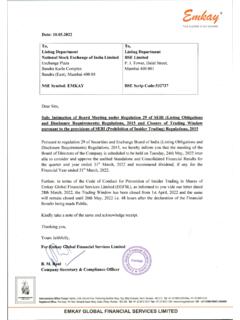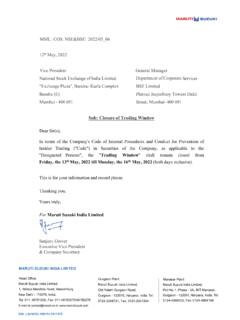Transcription of Revie wing the TCA: How to Salvage Something from the …
1 Reviewing the TCA: How to Salvage Something from the Wreckage of Brexit Peter Holmes May 2022. Progressive Economy Forum Reviewing the TCA: How to Salvage Something from the Wreckage of Brexit Peter Holmes, May 2022. Dr Peter Holmes is an Emeritus Fellow of the UK Trade Policy Observatory and an internationally-recognised expert in European integration issues. Dr Holmes taught in the Economics Department at Sussex University from 1974-2020, and has been a visiting Professor at the College of Europe in Bruges and Warsaw for many years. He has conducted research for the European Commission and the World Bank, and given evidence on Brexit and Freeports to parliamentary committees. He is regularly quoted by media outlets in the UK and internationally. 1.. 2.. Table of Contents Summary 5. Introduction 6. 2. How did we get here? 13. 3. Post 2019 Negotiations 17. 4. The Five Year Review 25. 5. Conclusion 30.
2 3. 4.. Summary Brexit, above all in its Johnson variant, has visibly damaged UK trade and the broader economy. There is, however, an opportunity in 2025 to modify the UK's direction of travel within the terms of the EU-UK Trade and Cooperation Agreement (TCA). Amongst opposition parties, Labour voted to support the deal in December 2020, whilst others opposed it outright. Modifications to the deal within the terms of the TCA are consistent with supporting the original deal in Parliament, or with having opposed it outright. The UK-EU TCA was a five year deal, not an indefinite arrangement like the Rome Treaty. In 2025, after the next election, there is to be a review of its terms. This paper argues that opposition parties should agree an agenda that would increase cooperation and alignment with the EU in areas that are mutually beneficial. This means accepting binding mutual commitments and giving up the delusion of untrammelled sovereignty in areas where this has proved of no value to the UK.
3 To succeed this strategy requires: Calling out the present government's futile tactic of using threats and deliberate divergence from the EU at all times;. Getting broad acceptance from the bulk of the electorate about a more cooperative relationship with the EU;. Convincing the EU that a new government in the UK can be a trusted negotiating partner. The present government is not able to negotiate because the EU does not believe it intends to adhere to any commitments it makes. 5.. Introduction The theme of this paper is that the Johnson government's deal with the EU, the 2020 Trade and Cooperation agreement (TCA) is not set in stone. Unlike the Rome Treaty, which was of indefinite direction , the TCA is subject to renewal, revision or termination every 5 years. Any party that approved it did not agree to it forever, but simply until 2025 - which will be after the next general election. It is imperative that opposition parties, who may form the government in 2025, begin to work out now what attitude the UK should take in the forthcoming negotiations.
4 Brexit is not done in two senses. First, there are many unfinished negotiations, some started and some forthcoming. As many predicted, Brexit has meant the prospect of endless negotiations with the EU. Nor has Brexit dropped off the political agenda. The forecasts that a hard Brexit would do serious economic damage have proven correct, as we describe in detail below. Several issues were left out of the initial TCA deal and instead identified as issues for future negotiations, such as Financial Services or the relationship between the EU ETS and the UK's emissions scheme. There were other areas that were noted as potentially open to discussion, such as mutual recognition. The institutional set up of council and committees could explore other areas, as well there being dispute settlement arrangements. Second, opinion polls indicate that this lack of closure is acknowledged by the public and that there is no social consensus on the details of the current deal.
5 Indeed, far from there being an acceptance of Brexit, polls show a consistent majority agreeing with the view that Brexit was a Even the government is telling the population that its own Brexit deal was deeply flawed, for example by claiming that the Northern Ireland Protocol must be changed. How this public opinion is to be interpreted is unclear. Brexit hardliners imply that the solution to our current problems is an even harder Brexit. On the other 1 Woodcock, A. (2 January 2022), Brexit poll: One year on, voters believe leaving EU has harmed UK's interests , Independent. At: 6.. side, there is little explicit demand for re-joining, but the present situation is not favoured by anyone. The idea that the Brexit debate is gone and can be forgotten is far from true. 2. However, this lack of fundamental clarity does not mean nothing should be done. The oven-ready Brexit deal created an unstable equilibrium which needs to be revised one way or another.
6 In one scenario, the government will create further tensions and provoke retaliation, including renouncing the Northern Ireland Protocol; it will choose pointless regulatory divergence and seek to sign third party trade provisions that create a need to have more onerous border restrictions with the EU. The alternative route is that the UK will make use of the negotiations that are still needed to complete the TCA, and above all make use of the revision of the TCA in 2025, to reduce trade tensions between itself and the EU. The Political Declaration of 2019, on which the Johnson government was elected, promised a far closer relationship than the final TCA delivered. This government has claimed that winning the election gave it the right to renege on its promises; but for any future government, the promises contained in the Political Declaration and the Withdrawal Agreement of 2019 constitute the minimum agreed negotiating space when the terms of Brexit are reviewed in 2025.
7 The actual TCA was extremely shallow but allowed for modifications after 2025 through the Review process. Negotiations to come There is, then, a window in the next two years to revisit the hasty and harmful agreement made by Johnson. This does not require a reversal of Brexit, but a demand to make Brexit work in such a way that we are able to align ourselves more closely with our neighbours and key trading partners. Both the domestic British politics of Brexit and, crucially, the TCA itself, create this option. The commitment the UK government and the EU have agreed to is very clear. Article of the final TCA text states: The Parties shall jointly review the implementation of this Agreement and supplementing agreements and any matters related thereto five years 2 For example, Willems, M. (20 October 2021), Temporary Brexit? Half of young British business owners expect UK will apply to rejoin the EU , City AM.
8 At: british-business-owners-expect-uk-will-a pply-to-rejoin-eu/. 7.. after the entry into force of this Agreement and every five years International relations expert Jacob Funk Kirkegaard of the Peterson Institute of International Economics, noted immediately that: The agreement's general review clause is scheduled for every five years, like the USMCA's six-yearly review clause. Thus the TCA's review would come no later than 2025, after which it can be extended, renegotiated, or wholly or partially terminated. Given that the TCA does not cover many parts of the EU and UK economies, including services sectors and data- driven commerce, the future could portend endless Brexit negotiations. 4. As a point of detail, there is some question over whether the review would be in 2025 or 2026. The TCA agreement was signed on Dec 24th 2020 and provisionally applied from Jan 1 2021 but the EU website states that it formally came into effect on May 1st 2021.
9 In the present article we will refer to 2025 as the deadline, but two things are clear. First, the present government cannot insist on the right to conclude a new agreement before the end of 2024, and it will be up to its successor (which might of course be a renewed conservative mandate), to decide on revision of the TCA. Second, there will be some flexibility over timing. There is one small way that the TCA does create new opportunities: the EU. relaxed its all or nothing no cherry picking rule. The UK can negotiate an agreement on Sanitary and Phytosanitary (SPS) products, or even possibly the free movement of musicians without signing up to the entirety of the EU acquis. 5. The Commission website clearly states that In addition, the Trade and Cooperation Agreement does not cover any decisions relating to equivalences for financial services, the adequacy of the UK data protection regime, or the assessment of the UK's sanitary and phytosanitary regime for the purpose of listing it as a third country 3 Trade and Cooperation Agreement (December 2020), Final Provisions, Article 6.
10 At: https://eur- :22020A1231(01). 4 Kierkegaard, (January 26, 2021), Did the Brexit deal ful l Boris Johnson's political agenda? , Petersen Institute for International Economics. At: watch/did-brexit-deal-ful ll-boris-johnsons-political-agenda 5 Acquis is the body of EU law. On this example, see brexit-visas-for-musicians-explained/. 8.. fi fi allowed to export food products to the EU. Indeed, these are unilateral decisions of the EU and are not subject to Meanwhile, the periodic five-year review approach allows the UK to take small steps at a time to improve our situation without committing to rejoining. There would be a (small) price to pay in terms of regulatory autonomy, but the purpose of this paper is to suggest ways in which the UK can identify mutually beneficial options. The second theme of the paper is to stress that this renegotiation cannot be left to 2024/25. Damaging policies introduced in the meantime that serve only to demonstrate claims to sovereignty and obstruct cooperation must be opposed.




